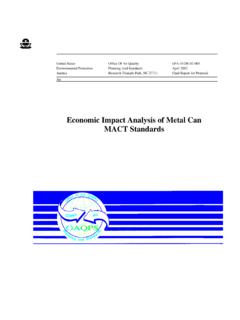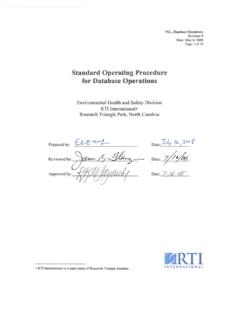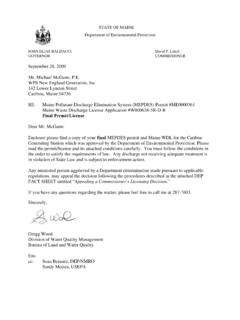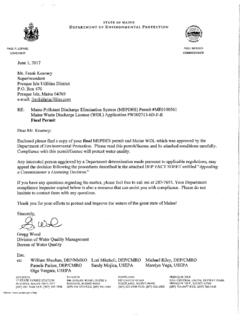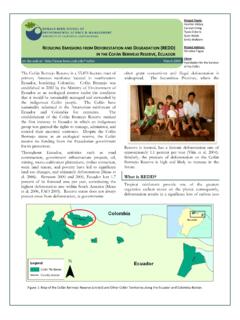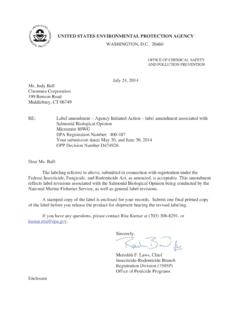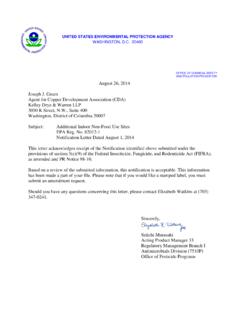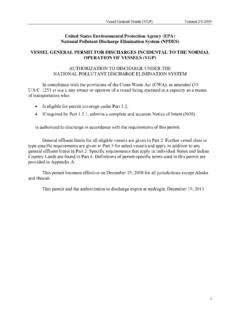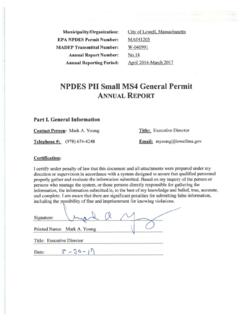Transcription of EPA's Action Development Process: Administrative Records ...
1 Regulatory Development Series EPA's Action Development process Administrative Records Guidance September 2011. 1. Table of Contents Table of Contents .. 2. What is the purpose of this document? .. 3. What is the Administrative record ? .. 4. Why are Administrative Records important? .. 4. What is the goal of the Administrative record? .. 5. Why are deliberative materials not part of the record? .. 5. What kinds of documents are deliberative ? .. 6. What documents should generally be in EPA's Administrative record? .. 7. What documents should generally not be in EPA's Administrative record?
2 9. How is the Administrative record different from a docket or other publicly available viewing file? .. 10. When is the Administrative record developed? .. 11. Who should develop and maintain the record? .. 11. What other Agency guidance is available relating to Administrative Records ? .. 12. 2. What is the purpose of this document? This document describes EPA's practices for compiling Administrative Records for use in litigation challenging EPA decisions. The principles outlined below are intended to help inform EPA personnel about basic principles for record compilation, provide information to the public on how EPA compiles Records , and to contribute to an orderly process for judicial review based on a complete record.
3 This document is consistent with the US Department of Justice recommendation that agencies develop guidance on the compilation and contents of the Administrative record. (Memorandum from Ronald J. Tenpas, Assistant Attorney General, to Selected Agency Counsel, December 23, 2008.). Filing a complete Administrative record is critical to defending EPA decisions in court. Where litigation is likely, it is also very important to focus on record Development through the entire process of decision-making. This document reflects both case law and long-standing Agency practice in compiling and defending Administrative Records for EPA decisions.
4 1. Specifically, this document is intended to: Clarify EPA's practice regarding which documents would generally be included and which documents would generally not be included in the Administrative record for an EPA decision that has been or will be challenged in Court and is reviewable under the Administrative Procedure Act (APA). Provide assistance to EPA personnel in assembling these Administrative Records . While decisions about what to include in an Administrative record depend upon many factors that will be specific to each statutory mandate and decision-making process , there are some general principles that should aid this process and reduce the time, effort and transaction costs in assembling Administrative Records in response to a court challenge and in addressing the potential consequences of having an inadequate record.
5 Enhance the defensibility of EPA decisions by ensuring that the underlying Administrative record includes all relevant information that EPA considered and any necessary responses to that information. The Development of Administrative Records is a highly case-specific endeavor and these recommendations do not address all questions concerning these Administrative Records . However, this document should provide clarity and assistance for the most often-asked questions pertaining to Administrative Records . Questions that are not addressed in this document should be 1. Note that some Agency programs have developed specific guidance for their programs or have statutory or regulatory provision that govern record compilation; for example, Comprehensive Environmental Response Compensation and Liability Act (CERCLA) response actions and Clean Water Act (CWA) State water quality standards (WQS) approval decisions.
6 While this guidance is intended to be consistent with those programs, those more specific provisions or guidance concerning record compilation govern. 3. referred to the Office of General Counsel (OGC) or Regional attorney working on a particular matter. We may update this document as necessary to address additional issues. 2. What is the Administrative record ? The Administrative record filed with a court is the set of non-deliberative documents that the decision-maker considered, directly or indirectly ( , through staff), in making the final decision. 3 The record should include all the factual, technical, and scientific material or data considered in making the decision, whether or not those materials or data support the decision.
7 If the decision-making process included one or more public comment periods, the Administrative record will include all public comments submitted to EPA as part of those comment periods, whether or not those comments support EPA. Note that the Administrative record for an Action does not necessarily include all documents related to a matter that are official government Records under the Federal Records Act. For example, official internal memoranda related to an Action may be agency Records but not part of the Administrative record because they are deliberative, as discussed below.
8 Why are Administrative Records important? EPA's decisions are generally subject to court review under the Administrative Procedure Act (APA). The APA provides that review of agency actions is based on the whole record.. When an EPA final Action is challenged, EPA generally is required by the Court to file its Administrative record with the Court and make the record available to the litigating parties. The Administrative record is the whole record under the APA; it is where the courts look to determine whether the agency Action was reasonable and consistent with applicable legal requirements.
9 (For the leading Supreme Court case on judicial review of agency actions under the APA, please see Citizens to Preserve Overton Park v. Volpe, 401 402 (1971)). The standard of review courts use when reviewing an agency Action under the APA is whether an agency Action is arbitrary, capricious, an abuse of discretion, or otherwise not in accordance with law. One frequently cited standard for making this determination is whether 2. Please note that this guidance is intended to address compilation of Administrative Records for purposes of litigation challenging an Agency decision. It does not address record compilation and retention requirements pursuant to discovery orders or litigation hold memoranda; such compilations may be far broader than the Administrative record for the Agency Action at issue.
10 3. A number of different phrases with the same meaning may be used interchangeably to describe the contents of the Administrative record. For example, the Administrative record may be referred to as the set of documents that provides the basis or forms the basis for an Action ; that the agency or decision-maker considered ; that the decision-maker considered either directly or indirectly ; or that the agency or the agency decision-maker relied on.. 4. the decision was based on a consideration of the relevant factors and whether there has been a clear error of judgment. Overton Park at 416.
